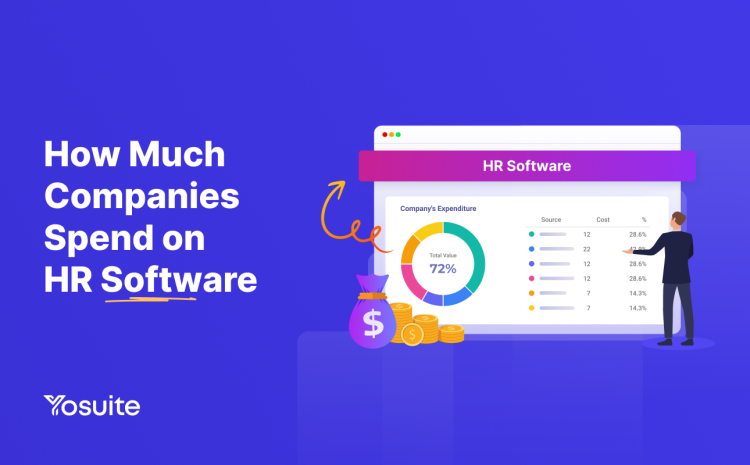How much do companies spend on HR software? HR software expenditure varies based on company size, industry, desired features, and vendor.
Startup costs range from a few thousand dollars for basic solutions. They can reach hundreds of thousands for enterprise-grade platforms. The costs include software licensing, implementation fees, and hardware upgrades.
Does it sound too expensive?
Now, let’s take a look at the return on investment (ROI)!
Researches suggest an ROI for HR software ranging from 30% to 150% within three years. In this blog post, I will discuss more details about this.
Types of HR Software and Its Cost
The diverse landscape of HR software caters to various HR functions, each with its own pricing model and cost range. Here’s a breakdown:
| Types of HR Software | Function | HR Pricing Model | HR Tools Pricing |
|---|---|---|---|
| Human Resource Information System | Centralized database for employee data, including payroll, benefits, and contact information. | Per user/employee per month, tiered feature sets. | $1-$15+ |
| Human Capital Management | Integrates HRIS with additional functionalities like talent management, performance management, and workforce analytics. | Per user/employee per month, tiered feature sets, sometimes with additional module costs. | $4-$15+ |
| Applicant Tracking System | Streamlines recruitment process from posting jobs to managing applications and interviews. | Per user/recruiter per month, per open position, per hire. | $15-$35+ |
| Learning Management System | Delivers online training, tracks employee progress, and manages learning content. | Per user/learner per month, per course, per feature set. | $2-$11+ |
| Performance Management Software: | Simplifies performance reviews, feedback processes, and goal setting. | Per user/employee per month, tiered feature sets. | $4-$25+ |
| Payroll Software | Automates payroll processes, including tax calculations, direct deposit, and reporting. | Per employee per month, tiered feature sets, transaction fees. | $3-$7+ |
| Onboarding Software | Streamlines the new employee experience with paperwork, documentation, and training modules. | Per month, tiered feature sets. | $50-$5,000 |
Additionally:
- Pricing models can be flexible: Some vendors offer discounts for longer contracts or prepayments.
- Consider implementation and support costs: These can add 10-20% to the software cost.
- Compare features and pricing before making a decision: Free trials are often available.
How Much Do Companies Spend on HR Software per Month

To determine how much companies are willing to spend on HR software per month, there were studies conducted to comprehend the impact of HR software. These studies shows:
- Companies spent an average amount of $483 per employee per month.
- Employers spent $40 per employee per month on HR technology and services way back in 2020.
The figures are expected to rise as time goes by. In fact, Fortune Business Insights forecasts a growth in global spending on the human resource technology market, projecting an increase from $24 billion in 2021 to $35 billion by 2028.
Now, what are the sectors that most spend on HR technology? Below are the spenders as identified by Enterprise Strategy Group ESG:
- Banking
- IT
- Telecom
- Manufacturing
- Retail
- Healthcare
Among these sectors, IT and Telecom lead in driving convergence between IT and HR tech. On the other hand, the Healthcare sector (Hospitals, Clinics, and other healthcare providers) is projected to grow from USED 0.94 Billion to USED 1.34 Billion by 2032. This exhibits a compound yearly growth rate (CAGR) of 4.60% during the forecast period (2023-2032).
😮 😮😮 The figures aren’t that small to undermine!
While we know that the actual spend on HR software may greatly vary depending on several factors, such as:
HR Software Price
- HR solutions use a subscription pricing model, with monthly or annual fees paid to the software vendor. Costs range from $3 to $1,239 per month, with advanced systems costing $688 to $3,500+ per month.
Industry:
- Tech companies and professional services: Often invest more in HR software due to their emphasis on talent acquisition and retention.
- Manufacturing and retail: May spend less on HR software due to more standardized roles and processes.
- Basic HRIS functionality: Costs less, typically within the $3.50-$25 per user per month range.
- Comprehensive HCM suite: Includes additional modules like talent management and workforce analytics, with costs ranging from $10-$250+ per user per month.
- Specialized solutions: Focused on specific functions like payroll or performance management, with varying pricing depending on features and complexity.
Remember, the right software can bring big returns. It can boost productivity, make employees happier, and reduce admin stress. As such, cost should not be the only factor to be taken into account.
HR Software’s ROI: A Profitable Investment for Your Business

HR software can significantly boost efficiency and productivity because of its automation. Amazing right? But here’s the real deal: Does HR software bring ROI? Obviously, “YES”!
According to Chad Brooks from business.com, approximately 3.2 million small-to-medium businesses (SMBs) depend on cloud-based HR software for the management and administration of intricate HR functions. Based on their interactions with the SMBs decision-makers, they found that:
- A majority of 69% of users affirmed that the implementation of HR software contributed to reducing payroll processing time in their business.
- 25% reported enhanced legal compliance.
- 22% of professionals indicated that HR software enhanced both team member retention and the quality of job applicants.
- 21% affirmed that they got high quality candidates and improved employees skills/goal-setting.
But, how do you compute the ROI?
ROI can be determined using this simple formula: the outcome as a percentage, divide the net return on investment by the investment cost and multiply the result by 100.
Now that you know the formula on getting the ROI, it is important to take note these essential elements to maximize the ROI:
- Choose the right software for your needs: Don’t just go for the cheapest option.
- Get your employees on board: Train your employees on how to use the software and make sure they understand the benefits of using it.
- Track your results: Keep track of how the software is impacting your HR processes and employee engagement. This will help you identify areas where you can make further improvements.
Why Do Companies Switch to HR Software?
HR cost per employee benchmark has reached an average of $2,524 annually. Meanwhile, its HR costs as a percentage of revenue benchmark have reached 0.74%. The high cost of HR functions has pressured most, if not all, organizations to cut costs without affecting their overall operation. This is a major reason why companies switch to HR software to keep HR operations and achieve better business outcomes.
Additionally. here are some of the most compelling reasons why companies decide to ditch their manual processes and embrace HR software:
1. Increased Efficiency and Productivity
Manual HR tasks are known for being time-consuming and also prone to errors. These tasks include:
- Payroll
- Benefits Administration
- Time Keeping
With HR software, those tasks were automated, thus saving HR professionals valuable time and spent their time on more strategic initiatives which includes:
- Talent Acquisition
- Employee Engagement
- Performance Management
Because everything is automated with software, HR professionals save up to 30% of their time compared to manual processes. This automation leads to significant cost reduction while achieving efficiency.
2. Reduced Administrative Costs
Automation eliminates the need for manual data entry which leads to the reduction of administrative staff. This means that companies save considerable cost from hiring staff.
Additionally, HR software helps the companies reduce their administrative costs by up to 25%.
3. Improved Employee Engagement and Retention
One of the many benefits of HR software is employee engagement. Companies that give priority on employee engagement most likely have a higher retention rate and are 21% more profitable. The employees felt satisfied and happy while working because they were given importance, thus, they were less likely to leave.
What HR software offers to companies to achieve a higher retention rate?
HR Software has features like performance management, feedback tools, and employee recognition programs. These features help companies to determine the outstanding employees and employees that need attention. With these features, companies can help their employees by creating plans to improve the employees performance avoiding resignation and termination.
4. Enhanced Talent Acquisition and Recruitment
Companies with effective recruitment software can save up to 50% on recruitment costs compared to companies using traditional methods. This is because HR software has features like Applicant Tracking System (ATS). This feature automates the recruitment process, manages applications, and schedules interviews.
5. Valuable Data and Insights
Businesses that rely on data management tools to make decisions are 58% more likely to beat their revenue goals than non-data-driven companies. This is one of the benefits HR software can provide. Data that covers everything from employee turnover to training effectiveness. The data provided by HR software helps businesses make better decisions about their HR strategies.
📌Also read:
How Does HR Software Work
How is HR Software Used in an Organization
How can HR Software Help your Business to Grow
How Much Do Companies Spend on HR Software: Conclusion
Indeed, a company’s budget allocation on HR software has a great impact on their financial resources. Despite that, businesses still have an unwavering willingness to invest in HR software. HR software has significantly improved their operation. It has boosted efficiency, accuracy, and total revenue.



Leave a Reply